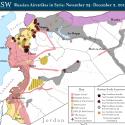Russian Airstrikes in Syria: December 7 - 17, 2015
Dec 18, 2015 - Genevieve Casagrande
Russia continues to use disinformation to present its air campaign as a constructive force in Syria ahead of the next wave of talks on the Syrian conflict.

Russia continues to use disinformation to present its air campaign as a constructive force in Syria ahead of the next wave of talks on the Syrian conflict.

The Hill (Dec. 7, 2015): "The U.S. and its allies must resist drifting into a flawed partnership with Russia and Iran in Syria in order to defeat ISIS....The apparently easy solution offered by Russia will nonetheless fail. Russia cannot actually deliver the results the U.S. requires in Syria."
Politico (Dec. 14, 2015): "With startling speed, the Middle Eastern terrorist organization known as ISIL has burst into the local news in Western nations, associated with attacks in Paris and now, if indirectly, with the mass shooting in San Bernardino, California....ISIL’s global strategy should come as no surprise."
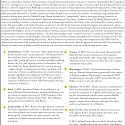
Russia’s intervention in Syria has forced the West to reengage Moscow in order to resolve the threat more immediately posed by ISIS even as President Vladimir Putin continues to bend international norms in his favor.
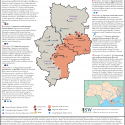
Russian-backed separatists intensified attacks along multiple frontline positions in Ukraine in early December 2015, demonstrating Moscow’s intent to continue destabilizing Ukraine after a two-month operational pause that coincided with the launch of Russian operations in Syria.
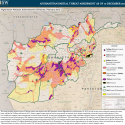
This map partially depicts areas of Taliban control and support and ISIS presence across Afghanistan as of December 10, 2015 as well as the status of district centers that have been attacked by Taliban militants in 2015. ISW will update this map as ground conditions change and as analysts continue to assess support zones.

ISIS achieved significant successes in its global strategy to expand its caliphate in the Near Abroad and defeat the West in November 2015. ISIS will likely use its affiliates to launch additional attacks on the West. Destroying the threat posed by ISIS will become more difficult as the organization gains strategic resiliency through its regional affiliate and global radicalization campaigns.

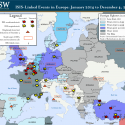
ISIS is executing a campaign to terrorize and polarize Europe. The organization has inspired, resourced, and directed attempted and successful attacks in the United Kingdom, France, Belgium, the Netherlands, Germany, Spain, Bosnia, Kosovo, and Turkey since January 2014. ISIS aims to punish countries acting against it in Iraq and Syria.
